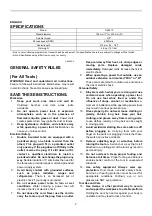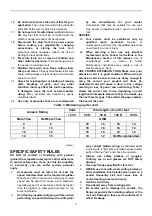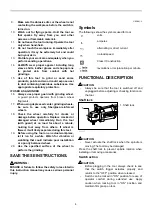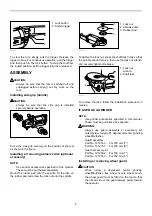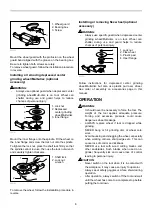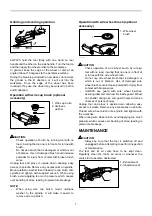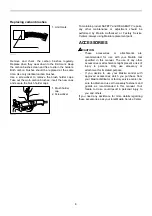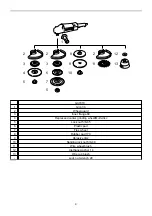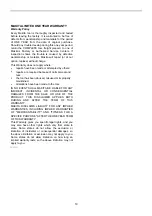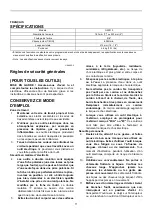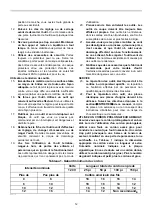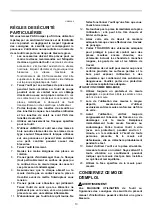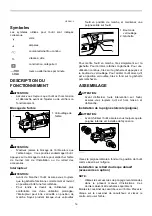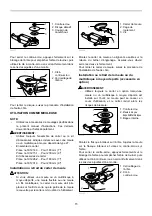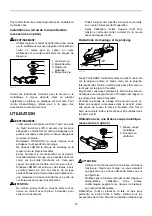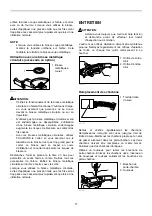
3
16.
Do not force tool. Use the correct tool for your
application.
The correct tool will do the job better
and safer at the rate for which it is designed.
17.
Do not use tool if switch does not turn it on or
off.
Any tool that cannot be controlled with the
switch is dangerous and must be repaired.
18.
Disconnect the plug from the power source
before making any adjustments, changing
accessories, or storing the tool.
Such
preventive safety measures reduce the risk of
starting the tool accidentally.
19.
Store idle tools out of reach of children and
other untrained persons.
Tools are dangerous in
the hands of untrained users.
20.
Maintain tools with care. Keep cutting tools
sharp and clean.
Properly maintained tools with
sharp cutting edges are less likely to bind and are
easier to control.
21.
Check for misalignment or binding of moving
parts, breakage of parts, and any other
condition that may affect the tool’s operation.
If damaged, have the tool serviced before
using.
Many accidents are caused by poorly
maintained tools.
22.
Use only accessories that are recommended
by the manufacturer for your model.
Accessories that may be suitable for one tool,
may become hazardous when used on another
tool.
SERVICE
23.
Tool service must be performed only by
qualified repair personnel.
Service or
maintenance performed by unqualified personnel
could result in a risk of injury.
24.
When servicing a tool, use only identical
replacement parts. Follow instructions in the
Maintenance section of this manual.
Use of
unauthorized parts or failure to follow
Maintenance instructions may create a risk of
electric shock or injury.
USE PROPER EXTENSION CORD. Make sure your
extension cord is in good condition. When using an
extension cord, be sure to use one heavy enough to
carry the current your product will draw. An
undersized cord will cause a drop in line voltage
resulting in loss of power and overheating. Table 1
shows the correct size to use depending on cord
length and nameplate ampere rating. If in doubt, use
the next heavier gage. The smaller the gage number,
the heavier the cord.
Table 1: Minimum gage for cord
Ampere Rating
Volts
Total length of cord in feet
120 V
25 ft.
50 ft.
100 ft.
150 ft.
More Than
Not More Than
AWG
0
6
18
16
16
14
18
16
14
12
6
10
10
12
16
16
14
12
12
16
14
12
Not Recommended
000173
USB038-6
SPECIFIC SAFETY RULES
DO NOT let comfort or familiarity with product
(gained from repeated use) replace strict adherence
to sander safety rules. If you use this tool unsafely
or incorrectly, you can suffer serious personal
injury.
1.
Accessories must be rated for at least the
speed recommended on the tool warning label.
Wheels and other accessories running over rated
speed can fly apart and cause injury. Maximum
operating speed of accessories should be higher
than the highest no load speed marked on the
tool’s nameplate.
2.
Hold tool by insulated gripping surfaces when
performing an operation where the cutting tool
may contact hidden wiring or its own cord.
Contact with a "live" wire will make exposed metal
parts of the tool "live" and shock the operator.
3.
Always use safety glasses or goggles.
Ordinary eye or sun glasses are NOT safety
glasses.
4.
Use only flanges specified for this tool.
5.
NEVER use tool with wood cutting blades or
other sawblades. Such blades when used on a
sander frequently kick and cause loss of
control leading to personal injury.
6.
Hold the tool firmly.
7.
Keep hands away from rotating parts.
8.
Be careful not to damage the spindle, the
flange (especially the installing surface) or the
lock nut. Damage to these parts could result in
wheel breakage.
Содержание GA7910
Страница 31: ...31 ...


